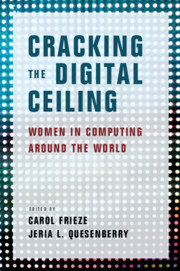Book contents
- Cracking the Digital Ceiling
- Cracking the Digital Ceiling
- Copyright page
- Contents
- Contributors
- Acknowledgments
- Introduction
- Part I Global Perspectives
- Part II Regional Perspectives
- 4 Sociocultural Complexities of Latin American and Caribbean Women in Computing
- 5 A Gender Perspective on Computer Science Education in Israel
- 6 Factors Influencing Women’s Ability to Enter the Information Technology Workforce
- Part III Cultural Perspectives from the United States and Europe
- Part IV Cultural Perspectives from Asia-Pacific
- Conclusion
- Notes
- Index
- References
5 - A Gender Perspective on Computer Science Education in Israel
From High School, through the Military and Academia to the Tech Industry
from Part II - Regional Perspectives
Published online by Cambridge University Press: 10 October 2019
- Cracking the Digital Ceiling
- Cracking the Digital Ceiling
- Copyright page
- Contents
- Contributors
- Acknowledgments
- Introduction
- Part I Global Perspectives
- Part II Regional Perspectives
- 4 Sociocultural Complexities of Latin American and Caribbean Women in Computing
- 5 A Gender Perspective on Computer Science Education in Israel
- 6 Factors Influencing Women’s Ability to Enter the Information Technology Workforce
- Part III Cultural Perspectives from the United States and Europe
- Part IV Cultural Perspectives from Asia-Pacific
- Conclusion
- Notes
- Index
- References
Summary
This chapter focuses on computer science (CS) education in Israel, which is known as the “Start-Up Nation” due to its high level of technological innovation and high number of start-ups in the country (Sensor and Singer, 2009). It tells a story, from a gender perspective, that starts in high school, passes through the military service and university stages, and concludes with what happens to female computer scientists in the job market, whether it be in academia or industry. We show that, as expected, external characteristics and cultural aspects matter in determining women’s participation in CS education and CS professions.
- Type
- Chapter
- Information
- Cracking the Digital CeilingWomen in Computing around the World, pp. 90 - 103Publisher: Cambridge University PressPrint publication year: 2019
References
- 2
- Cited by

